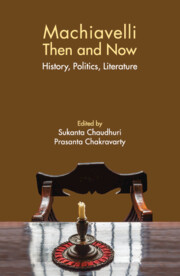8 - Riscontro: Machiavelli’s Art of History
Published online by Cambridge University Press: 21 January 2022
Summary
John Pocock, at the beginning of his masterpiece The Machiavellian Moment, claimed that
a vital component of republican theory—and, once this had come upon the scene, if no earlier, of all political theory—consisted of ideas about time, about the occurrence of contingent events of which time was the dimension, and about the intelligibility of the sequences (it is as yet too soon to say processes) of particular happenings that made up what we should call history.
An analogous caution is common among interpreters of Machiavelli's work: history, in the writings of the Florentine Secretary, is in turn an application of the knowledge of the ancients, offering a perspective on current political issues; an inventory of examples and experiences from the past; and the mere practice of something analogous to chronicling.
My starting point and main hypothesis is that in Machiavelli's thought, history plays a crucial role in a distinctive way. To explain in detail, history is not only a theme, the subject of erudite philological study with material applications, but also an object that needs structural analysis to define its topological role and its internal, constitutive oppositions. My hypothesis is that the keynote of Machiavelli's historical knowledge is the notion of riscontro, as expounded in the seminal text of the Ghiribizzi al Soderino, a letter of 1506 to Giovan Battista Soderini. The riscontro, which is elaborated for the first time in the Ghiribizzi and which keeps returning through the entire Machiavellian corpus, is the encounter between a form of political action, a modo del procedere in Machiavelli's language, and a specific historical conjuncture, the qualità dei tempi. This Machiavellian construct of a historical event articulates—that is to say, both separates and connects—the two factors in a diachronic sequence and allows us to identify the causes of political change.
In this chapter, I will try to substantiate my hypothesis through a philological and theoretical analysis of Machiavelli's first conceptualization of this notion, in the Ghiribizzi al Soderino. My analysis will be articulated in three sections, corresponding to the three figures that the structural opposition between political concepts and principles on the one hand and the events of the times on the other can assume. In the first section, I will describe the first (and apparently only) meaning of riscontro as a deterministic relationship governed by fortune.
- Type
- Chapter
- Information
- Machiavelli Then and NowHistory, Politics, Literature, pp. 145 - 161Publisher: Cambridge University PressPrint publication year: 2022



